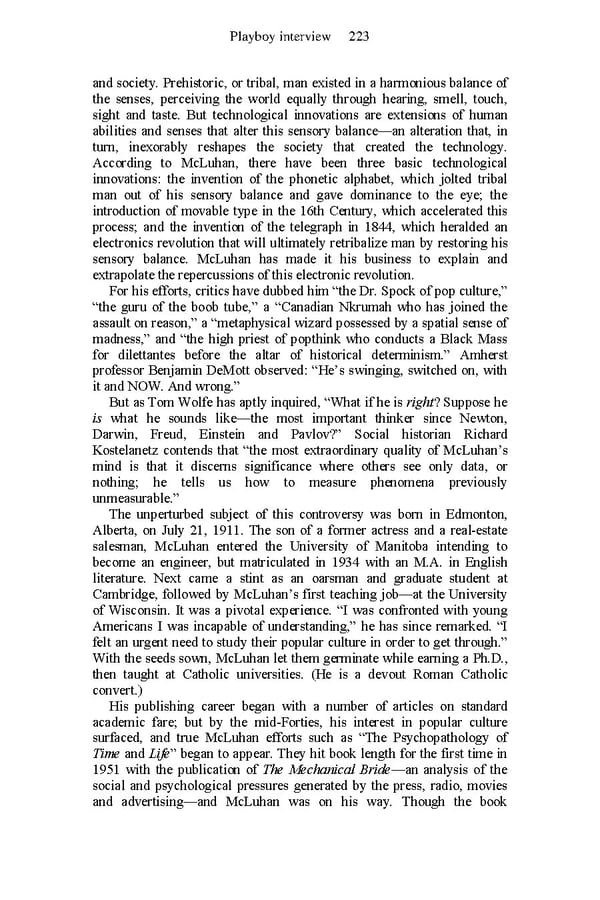Playboy interview 223 and society. Prehistoric, or tribal, man existed in a harmonious balance of the senses, perceiving the world equally through hearing, smell, touch, sight and taste. But technological innovations are extensions of human abilities and senses that alter this sensory balance—an alteration that, in turn, inexorably reshapes the society that created the technology. According to McLuhan, there have been three basic technological innovations: the invention of the phonetic alphabet, which jolted tribal man out of his sensory balance and gave dominance to the eye; the introduction of movable type in the 16th Century, which accelerated this process; and the invention of the telegraph in 1844, which heralded an electronics revolution that will ultimately retribalize man by restoring his sensory balance. McLuhan has made it his business to explain and extrapolate the repercussions of this electronic revolution. For his efforts, critics have dubbed him “the Dr. Spock of pop culture,” “the guru of the boob tube,” a “Canadian Nkrumah who has joined the assault on reason,” a “metaphysical wizard possessed by a spatial sense of madness,” and “the high priest of popthink who conducts a Black Mass for dilettantes before the altar of historical determinism.” Amherst professor Benjamin DeMott observed: “He’s swinging, switched on, with it and NOW. And wrong.” But as Tom Wolfe has aptly inquired, “What if he is right? Suppose he is what he sounds like—the most important thinker since Newton, Darwin, Freud, Einstein and Pavlov?” Social historian Richard Kostelanetz contends that “the most extraordinary quality of McLuhan’s mind is that it discerns significance where others see only data, or nothing; he tells us how to measure phenomena previously unmeasurable.” The unperturbed subject of this controversy was born in Edmonton, Alberta, on July 21, 1911. The son of a former actress and a real-estate salesman, McLuhan entered the University of Manitoba intending to become an engineer, but matriculated in 1934 with an M.A. in English literature. Next came a stint as an oarsman and graduate student at Cambridge, followed by McLuhan’s first teaching job—at the University of Wisconsin. It was a pivotal experience. “I was confronted with young Americans I was incapable of understanding,” he has since remarked. “I felt an urgent need to study their popular culture in order to get through.” With the seeds sown, McLuhan let them germinate while earning a Ph.D., then taught at Catholic universities. (He is a devout Roman Catholic convert.) His publishing career began with a number of articles on standard academic fare; but by the mid-Forties, his interest in popular culture surfaced, and true McLuhan efforts such as “The Psychopathology of Time and Life” began to appear. They hit book length for the first time in 1951 with the publication of The Mechanical Bride—an analysis of the social and psychological pressures generated by the press, radio, movies and advertising—and McLuhan was on his way. Though the book
 Essential McLuhan Page 229 Page 231
Essential McLuhan Page 229 Page 231